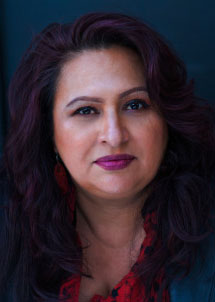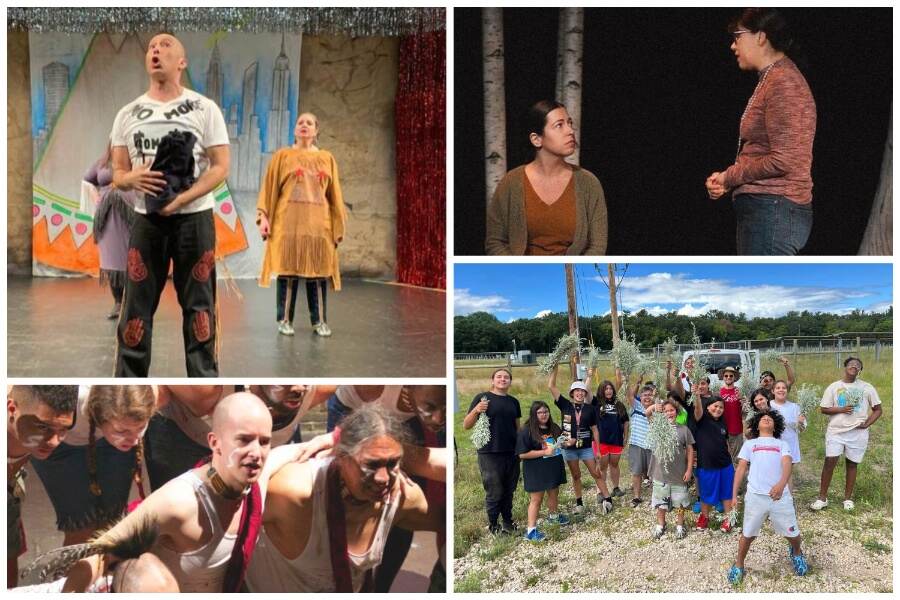Editor’s Note: In partnership with the Doris Duke Foundation and the Sheri and Les Biller Family Foundation, TCG’s THRIVE! Uplifting Theatres of Color initiative offered $1,140,000, equaling 46 grants in 3 categories, to U.S.-based (including Tribal lands and Territories) Black Theatres, Indigenous Theatres, and Theatres of Color (BITOC). In addition to the funds, 21 BITOC receiving RECOGNIZE category grants also participated in REBUILD, a learning cohort working with BIPOC consultants to strengthen their effectiveness in specific areas. The initiative was created with an advisory committee of 14 BIPOC theatre leaders and artists. To further uplift these companies, American Theatre magazine approached myself (Regina Victor, editor of Rescripted) and fellow cultural critic Jose Solís to curate and edit six articles highlighting the RECOGNIZE companies, with each of us guiding three pieces. It was our work to divide and then re-thread these companies together into articles with common themes, source writers and assign them, and edit their drafts, with American Theatre seeing to the final copy edit. These stories are examined through the lens of this year’s critically focused Rising Leaders of Color cohort (Amanda L. Andrei, Citlali Pizarro, and afrikah selah), as well as three Chicago-based writers (Dillon Chitto, Madie Doppelt, and Tina El Gamal). This six-part essay series showcases 21 examples of people doing the work, championing their culture, and finding creative solutions to generational problems. Thanks to Jose for being a wonderful thought partner in this project, and to Emilya Cachapero and Raksak Kongseng for their invitation and support.
How do we pass along stories and knowledge? What kinds of stories and knowledge do we share with others? And how do we maintain respect for stories and the cultures they come from, whether our own or those of others?
These questions animate and motivate the work of Native and Indigenous theatre artists, including four leaders I recently spoke with: Murielle Borst-Tarrant, artistic director of Safe Harbors NYC; Rhiana Yazzie, artistic director of New Native Theatre in St. Paul, Minn.; Opalanietet, founder of the New York-based Eagle Project; and Sharon Day, creator of Ikidowin Youth Ensemble in Minneapolis.
In talking with them about oral tradition, oral history, and language, a number of deeply entwined subjects arose: politics, geography, civil rights, and roles and tensions within the American theatre. These four Native/Indigenous artists share the origins and motivations behind their theatre companies, community service, and histories of performance across the continent.

Safe Harbors’ Murielle Borst-Tarrant noted that for many Native folks in urban areas, it was shared oral histories that kept their culture alive while they were in boarding schools apart from their homelands. A sense of displacement ran even deeper than their generation, of course, and many of the stories they shared were “about what it means to survive when we had to leave our homelands. My family has been in New York City since 1800, but what I remember is us always talking about going back home. It’s important to talk about how there was a time in the United States where you could not practice your language, you could not practice your culture, we couldn’t do any ceremonies. It was against the law. We were put into boarding schools.”
Borst-Tarrant recalled stories told by her mother, Muriel Miguel, an accomplished Native theatremaker and co-founder of New York City’s Spiderwoman Theater, about “survivors from boarding schools who came to New York City for work, and they wanted to teach.” These survivors taught Miguel and her friends “songs and dances that weren’t even from their tribes,” in an effort to preserve them. For Miguel and her generation, this exchange began in the 1950s, and by the ’70s, when Borst-Tarrant grew up, “Native people weren’t taking any shit anymore.” Miguel taught her daughter “about fighting, not for rights, but existence in this country. We were being completely erased out.”
It’s a struggle that goes on both within and outside the theatre, particularly when Native storytellers “entrust the world with our culture, with our oral traditions, with our spirituality, but there’s still extraction, spiritual extraction, cultural extraction, that happens to our communities,” Borst-Tarrant said. “We want people to understand what we’re coming from, but at the same time we have cultural exhaustion. We’re always very afraid, because our oral traditions have always been used against us.”

For Rhiana Yazzie at New Native Theatre, making theatre is a way to care not only for stories but for people. “I saw that there was this time period in a person’s life where you were no longer a youth, you couldn’t do youth programs, and you weren’t an elder—this is a time when people fall through the cracks,” she said, noting that this demographic has been at the core of her service in theatre. “That’s why we work with adults the majority of the time.”
New Native Theater serves this community with full knowledge, Yazzie said, that “coming from a lived experience as a Native person, there are so many other things that need attending to—many different kinds of disparities in our community. There’s language revitalization, there’s the unhoused population, there’s our opiate crisis, etc. If you took these deficits out of the average life of the Native person, maybe they would have the ability to say, ‘Hey, I’m just going to focus on theatre, and I’m going to make plays that look like plays that the American theatre sees.’ It’s a huge luxury for Native folks to be able to focus on something like that. I know that I’m really, really lucky to be able to.”
Even as Yazzie recognizes how fortunate she is, she also recognizes that “the practices of theatre are so harmful that Native folks, when they experience it, it’s like, ‘I don’t want to do that, I don’t want to contort myself to do these things that are so incredibly harmful’—i.e., leave your children behind, miss birthdays and funerals, not be a part of your community.”
She notes a bitter irony in this: “What we’re told as BIPOC people is, if you make theatre, you’ll better your community. But you have to sacrifice your own place in the community or your own financial well-being, or your own ability to have a family, because the arts does not afford many people to own a house or to have a family.”

After writer/director/performer Opalanietet worked on Carlisle—a play with music that satirized the infamous Carlisle Indian Industrial School before it closed in 1914 so it could send its students off to be disposable soldiers in World War I—he founded the Eagle Project in 2012 so that others could feel similarly empowered “to explore the American identity through the performing arts and our Native American heritage, so that we, as Americans, may have a more accurate recollection of our past and better understanding of our present, for a just and more inclusive vision for our future.”
The Eagle Project is designed to help Native artists develop new plays, give them a platform to practice their craft, and, as Opalanietet put it, create “the breathing room to find our more authentic selves.”
He noted the importance of this effort, “especially here in New York City, where Broadway is on the Broad Way, the Lenape path, and there’s no—to my knowledge anyway, and I’ve been in New York City a long time—there’s no plaque to honor that. There’s no information about that. We finally have a plaque in the lower part of the island about Werpoes Village, which was a Lenape village down near a spring there. But there’s very little as to the culture and the performance of the Lenape.”
He mentioned that he’s proud to share a lineage with other N.Y.-based Native artists, including Spiderwoman Theater, the Colorado Sisters, and AMERINDA. But to his knowledge, Eagle Project is “the only Lenape-led performing arts company on the traditional homelands of Lenape in Lenapehoking, which is basically the lower Hudson, and also Delaware River valleys.”

Meanwhile, in Minneapolis, Sharon Day’s Ikidowin Youth Ensemble is creating an outlet and providing theatre training to young people, who are “every bit as professional as any actors,” said Day. “When I see them, they make me so happy.”
Day’s work in theatre began as a response to the AIDS crisis in the 1980s. While working for the state of Minnesota, she found ways to create opportunities to address the public health emergency. “If we’re going to prevent HIV among young people, we need to educate them,” she explained, noting the stigma at the time of working with individuals and communities affected by HIV and AIDS. “I said, I think we can use storytelling. This is how we learn. We can take storytelling and we can create plays.”
Day counted the program as having around 30 young participants, from a “tier 1” level that includes those with a lot of experience in theatre and film, to new groups that come in each year. “Some of them hang around, and some of them don’t,” she said. Crucially, she added, some of the kids at Ikidowin live in homes with drug and alcohol use, and the program has helped them get through high school and college. In some cases, Day said, she’s working with the children of folks she helped before. “Everything that, just in terms of public health, one would do in a prevention program, we are doing: reinforcing, strengthening cultural identity, providing them with the knowledge they need.”
Over the years, Day has guided the growth of the program to address additional community concerns. One of the plays she wrote, “We Do It For the Water,” presents a non-violent message about Indigenous struggles to protect water and deals with “some of the water wars and Standing Rock,” referring to the nearly year-long protest by Natives and others of the Dakota Access Pipeline, which cuts through ancient tribal land. The play was directed by her grandson, Sir Curtis Kirby III, director of the Ikidowin Youth Theater Ensemble.
“My grandson always says, our stories are just stories until you see them come to life,” Day reflects. “And then we can see that they are the evident truth of our teachings.”
Amanda L. Andrei (she/hers) is a playwright, literary translator, and theatre critic based in Los Angeles.
Want to learn more about the THRIVE! grant recipients? Check out this new video featuring them here.


